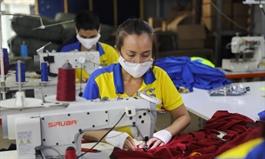E-commerce helps Vietnamese companies cope with the pandemic: Experts
E-commerce helps Vietnamese companies cope with the pandemic: Experts
Vietnam came second in Southeast Asia in terms of e-commerce market growth and third in size, behind Thailand and Indonesia.
E-commerce from being an option has grown into a key solution for Vietnamese companies to survive and cope with the Covid-19 impacts, said Ho Thi To Uyen, deputy director of the Ministry of Industry and Trade's Vietnam E-commerce and Digital Economy Agency (iDEA).

E-commerce is set to be hugely promising in Vietnam. Photo: Phuong Thu |
Speaking at a workshop on e-commerce promotion in Vietnam held in Hanoi today [November 24], Uyen said the pandemic has made substantial changes to customers’ behavior.
“They now prefer to buy online via shopping apps and social networks over going directly to supermarkets or convenience stores,” Uyen said.
“For many, e-commerce was the only way for them to buy basic necessities during the lockdown.”
Statistics revealed Vietnam’s e-commerce market recorded an annual growth of around 30% during the 2014-2019 period, taking the market size from US$2.97 billion in 2014 to $10.08 billion in 2019, or a triple-fold increase in a six-year period.
Last year, the market continued with an upward trend by expanding 18% amid the pandemic and reaching $11.8 billion.
“Vietnam came second in Southeast Asia in terms of market growth and third in size, behind Thailand and Indonesia,” Uyen added.
Uyen expected e-commerce to be hugely promising in the coming time while referring to a report from Google and Temasek that forecast the market size to hit $52 billion by 2025.
“Not only large-scale companies but business households and individuals are now selling products online,” she added.
Uyen also mentioned the growing trend of Livestream selling with an estimated 70-80,000 sessions per day in social networks in Vietnam and another 2-3,000 in e-commerce platforms.
Protecting customers’ rights is a key task
However, along with the rise of e-commerce, customers also face growing risks from buying products online.
Head of the MoIT’s Consumer Protection Division Cao Xuan Quang said the agency received up to 2,000 complaints on average from customers during the past three years.
“The figures are now rising, mostly due to inaccurate product information, wrong delivery, or inefficient dispute settlement mechanism,” Quang noted.
“While major e-commerce platforms have been positive in cooperating to resolve customers’ issues, the majority of complaints blame came from less known platforms or individual sellers,” he said.
In this case, the Director of Public Relations at Lazada Vietnam Vu Thi Minh Tu stressed the necessity for a clearly defined responsibility for both sellers and buyers, especially the provision of transparent, accurate, and sufficient information related to products.
Representative of Shopee Do Truc Quynh noted the platform has been working with commercial banks to withhold the money payable to sellers until buyers confirm their products are delivered in good condition and without any complaints.
“Customers should also have the right to return the products in case there are issues with the quality,” she said.
From the legal perspective, Quang from the Consumer Protection Division said the Government in September passed Decree No.85 regulating e-commerce platforms and activities in Vietnam that provides new changes for better protecting customers against previous regulations.
“The new decree specifies what kinds of information sellers are obliged to provide on products they are selling,” Quang said.
For foreign traders that have a minimum of 100,000 transactions from Vietnam, they are required to set up a representative office or an authorized entity in the country.
“This would ensure timely cooperation between parties to prevent any possible violations in e-commerce activities,” he said.
Quang, however, noted that the first step to work on a complaint would be to refer the issue to the seller, “efforts to protect customers’ rights would largely depend on the selling sides,” he added.
According to Quang, the ultimate goal of the authorities is to build a transparent and sustainable business environment for both businesses and customers.
“Customers could hardly be protected in an unhealthy business environment. On the contrary, businesses are not able to thrive if the dispute settling process takes too much time and resources,” Quang said.























